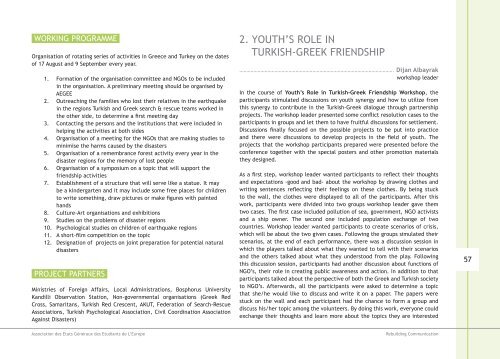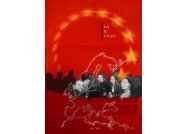turkish-greek civic dialogue - AEGEE Europe
turkish-greek civic dialogue - AEGEE Europe
turkish-greek civic dialogue - AEGEE Europe
You also want an ePaper? Increase the reach of your titles
YUMPU automatically turns print PDFs into web optimized ePapers that Google loves.
WORKING PROGRAMME<br />
Organisation of rotating series of activities in Greece and Turkey on the dates<br />
of 17 August and 9 September every year.<br />
1. Formation of the organisation committee and NGOs to be included<br />
in the organisation. A preliminary meeting should be organised by<br />
<strong>AEGEE</strong><br />
2. Outreaching the families who lost their relatives in the earthquake<br />
in the regions Turkish and Greek search & rescue teams worked in<br />
the other side, to determine a first meeting day<br />
3. Contacting the persons and the institutions that were included in<br />
helping the activities at both sides<br />
4. Organisation of a meeting for the NGOs that are making studies to<br />
minimise the harms caused by the disasters<br />
5. Organisation of a remembrance forest activity every year in the<br />
disaster regions for the memory of lost people<br />
6. Organisation of a symposium on a topic that will support the<br />
friendship activities<br />
7. Establishment of a structure that will serve like a statue. It may<br />
be a kindergarten and it may include some free places for children<br />
to write something, draw pictures or make figures with painted<br />
hands<br />
8. Culture-Art organisations and exhibitions<br />
9. Studies on the problems of disaster regions<br />
10. Psychological studies on children of earthquake regions<br />
11. A short-film competition on the topic<br />
12. Designation of projects on joint preparation for potential natural<br />
disasters<br />
PROJECT PARTNERS<br />
Ministries of Foreign Affairs, Local Administrations, Bosphorus University<br />
Kandilli Observation Station, Non-governmental organisations (Greek Red<br />
Cross, Samaritans, Turkish Red Crescent, AKUT, Federation of Search-Rescue<br />
Associations, Turkish Psychological Association, Civil Coordination Association<br />
Against Disasters)<br />
Association des Etats Généraux des Etudiants de L’<strong>Europe</strong><br />
2. YOUTH’S ROLE IN<br />
TURKISH-GREEK FRIENDSHIP<br />
.............................................................................................................. Dijan Albayrak<br />
workshop leader<br />
In the course of Youth’s Role in Turkish-Greek Friendship Workshop, the<br />
participants stimulated discussions on youth synergy and how to utilize from<br />
this synergy to contribute in the Turkish-Greek <strong>dialogue</strong> through partnership<br />
projects. The workshop leader presented some conflict resolution cases to the<br />
participants in groups and let them to have fruitful discussions for settlement.<br />
Discussions finally focused on the possible projects to be put into practice<br />
and there were discussions to develop projects in the field of youth. The<br />
projects that the workshop participants prepared were presented before the<br />
conference together with the special posters and other promotion materials<br />
they designed.<br />
As a first step, workshop leader wanted participants to reflect their thoughts<br />
and expectations -good and bad- about the workshop by drawing clothes and<br />
writing sentences reflecting their feelings on these clothes. By being stuck<br />
to the wall, the clothes were displayed to all of the participants. After this<br />
work, participants were divided into two groups workshop leader gave them<br />
two cases. The first case included pollution of sea, government, NGO activists<br />
and a ship owner. The second one included population exchange of two<br />
countries. Workshop leader wanted participants to create scenarios of crisis,<br />
which will be about the two given cases. Following the groups simulated their<br />
scenarios, at the end of each performance, there was a discussion session in<br />
which the players talked about what they wanted to tell with their scenarios<br />
and the others talked about what they understood from the play. Following<br />
this discussion session, participants had another discussion about functions of<br />
NGO’s, their role in creating public awareness and action. In addition to that<br />
participants talked about the perspective of both the Greek and Turkish society<br />
to NGO’s. Afterwards, all the participants were asked to determine a topic<br />
that she/he would like to discuss and write it on a paper. The papers were<br />
stuck on the wall and each participant had the chance to form a group and<br />
discuss his/her topic among the volunteers. By doing this work, everyone could<br />
exchange their thoughts and learn more about the topics they are interested<br />
Rebuilding Communication<br />
57







